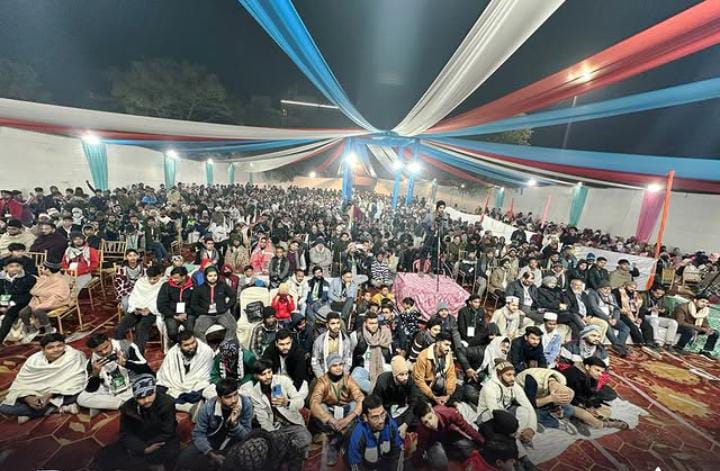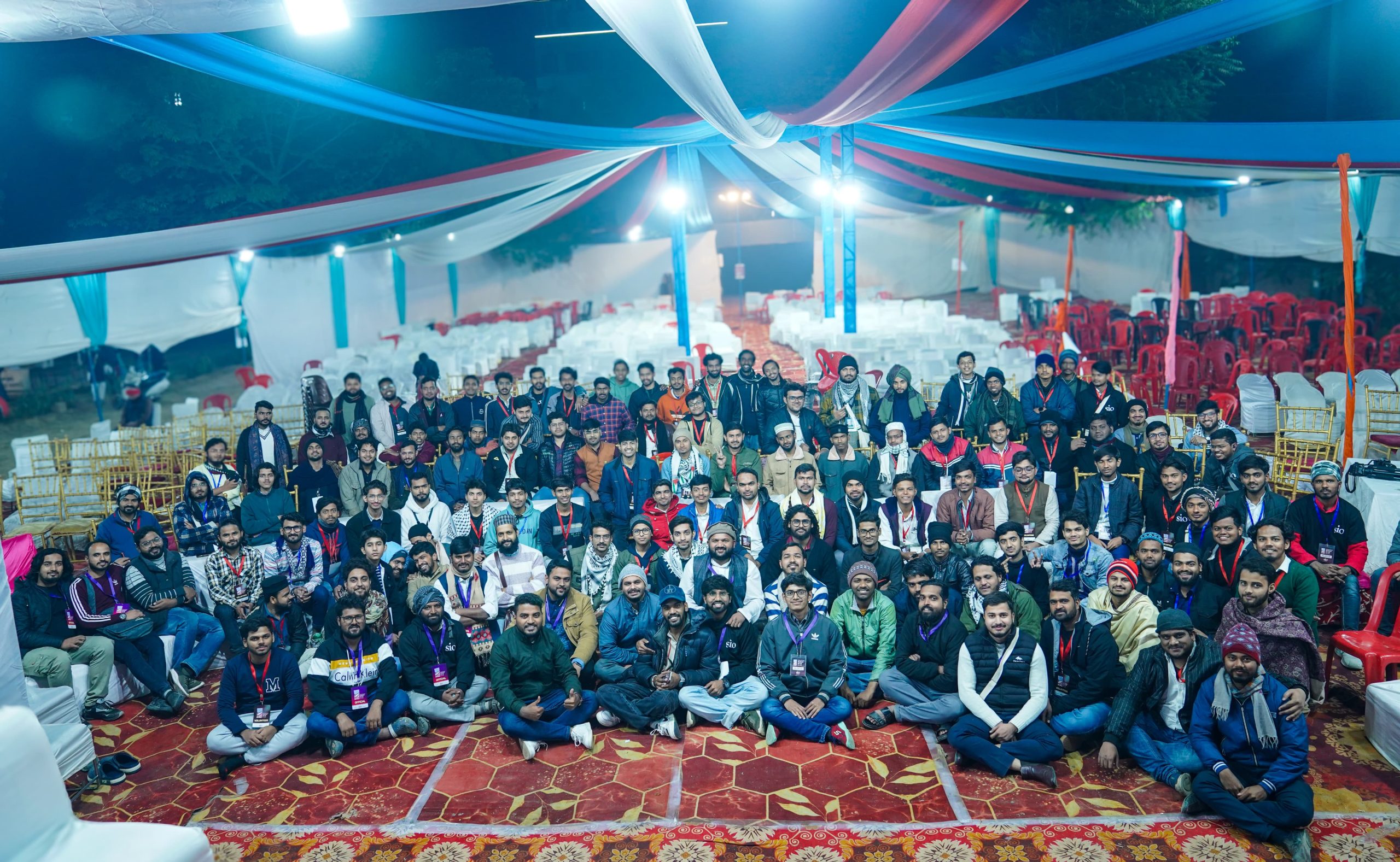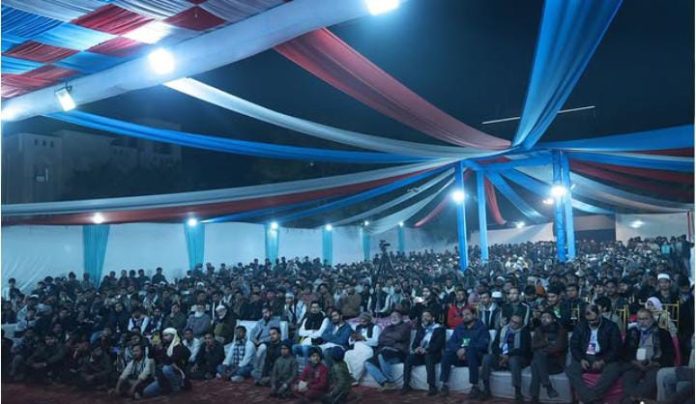– Khan Tahir
The three-day An Noor Literature Festival of SIO of India began on December 20 at around 10 AM with the recitation by Rajasthan Zonal President Brother Adil.
After Qirat, the General Secretary Salman Mubeen delivered the inaugural address, in which he provided details about the An Noor Literature Festival.
The festival featured four parallel stages named after prominent figures: the first stage was named Imam Maududi, the second Maryam Jameelah, the third Ma’il Khairabadi, and the fourth Aamir Usmani.
After the inaugural address, Dr. Muhiuddin Ghazi delivered a speech, sharing insights about the Quran that compelled everyone to reflect deeply upon its teachings.
In Session Two, programmes featuring Malik Motasim Khan, Akhtarul Iman, Professor Ritika Khera, Dr. Khan Yasir, and Mehtab Alam were held simultaneously on separate stages. These programmes included workshops, panel discussions, and conversations on topics such as Doms of Dissent: Muslims’ Quest for Justice and Political Agency; The Silent Archive: How Our Lives Become Data; Art, Culture, and Civilization: Thinking with Maulana Maududi; and Stories That Matter: The Art of Non-Fiction Writing
Around 4:30 PM, the Allama Iqbal Exhibition was inaugurated by Akhtarul Iman and Malik Motasim Khan, the Vice President of Jamaat-e-Islami Hind.
The highlight of this exhibition was its solidarity with Palestine. It emphasised the boycott of Israeli products. The exhibition also included brief introductions to leaders such as Maulana Abul A’la Maududi, Talal Asad, and Hassan al-Turabi, alongside a short introduction to SIO (Students Islamic Organisation).
Additionally, it commemorated the five-year completion of the controversial CAA and NRC laws under a dedicated section named “Sab Yaad Rakha Jayega” (Everything Will Be Remembered). This section highlighted the injustices faced by individuals imprisoned under these laws, including people like Umar Khalid and Sharjeel Imam, depicted in jail.
Near the exhibition, a stall by White Dot Publications was set up. It featured not only books from White Dot Publications but also books from several other publishers.
Moreover, over 20 stalls were organised, showcasing a variety of items such as perfumes, clothing, and food products.
In the third session of the first day, parallel programmes were held featuring S. Ameenul Hasan, Dr. Brahama Prakash Singh, Suhail KK, and Dr. Muhammad Rizwan. These sessions included speeches and conversations on the following topics Harmonies of Hate: Hindutva Art’s Dance with Violence; Crescent over Rainbow: Islam, Gender, and LGBTQ+ Discourses; Colouring the Canvas: Creativity, Culture, and Civilization; and A Symphony of Cultures: Melodies from Distant Shores.
During S. Ameenul Hasan’s session, a book titled “A Guide To Sexual and Gender Ethics” was launched by S. Ameenul Hasan, Suhailk KK, Ramees EK, Salman Mobin, Obaidur Rehman Naufal and Khan Tahir.
The last session of the first day featured a Cultural Night, which included a multilingual Naat recitation. Naats were recited in several languages, including Bengali, Urdu, Marathi, and Arabic, etc.
On the second day, the first session featured parallel programmes on separate stages with Dr. Nadira Khatoon, Prof. G. Aloysius, Mujahidul Islam, Sadaqat Faqih Mulla, Dr. Irfanullah Farooqi, and Dr. Danish Iqbal. The session topics were: Narratives in Motion: The Interrelation of Muslims and Movies; Language, Literature, and the Art and Politics of Translation; Wires and Woven Realities: The Symbiosis of Science, Technology, and Society; and Margins of the State: Identity and the Politics of Nationality.
In the second session, parallel programmes were conducted by Anis Ahmed, Abdul Khaliq, Hamza Sheikh, Ziyad Masroor Khan, Dr. P.C. Saidalavi, Dr. Siddiqui P.K., and Dr. Irfanullah Farooqi. These sessions included workshops, panel discussions, and conversations with authors. The topics were: (Un)Stratified Lives: Caste, Identity, and Muslim Marginality; Secularism, Religion, and Islam: Thinking with Talal Asad; Scripting Struggle: Politics, Violence, and the Art of Writing a Memoir; and The Alchemy of Ambition: Stories from the Forge of Entrepreneurship.
In the third session, programmes were held on separate stages featuring Saleem Khan, Dr. Khalid Mubashshir, Safeer Siddiqui, Zaki Ahmed, Suhail KK, Abdullah Azzam, and Khurram Murad. These sessions included panel discussions, speeches, workshops, and documentary screenings. The topics were: The Unholy Union: Hindutva’s Decolonial Paradox; A Century of Kafka: The Metamorphosis of Modernity and Postmodernity; When Pomegranate Turns Grey; Language and Literature: Leading the Future of Islam; and Sketching the Lives and Legacies: Stories of Literary Luminaries.
The Last session of the second day featured a Mushaira on Resistance and Justice with prominent poets including Sarfaraz Bazmi, Dr. Wahid Nazir, Dr. Khalid Mubashshir, Israr Razi, Irshad Mazhari, Anas Nabeel, and Safar Naqvi.
The session was presided over by Intizar Naeem, with Maqsood Anwar Maqsood from Doha, Qatar, as the Guest of Honor.
On the third and last day, the first parallel sessions were held featuring Sharjeel Usmani, Wardha Beg, Fawwaz Shaheen, Aditya Menon, Ali Shan Jafri, Salman Ahmed, Dr. Hafiz Ahmed, Dr. A.K. Muneer, Javed Mohammad, Siddique Kappan, Asif Iqbal Tanha, and Adnan Kafeel Darwesh.
The session topics were Scripted Silences: Media and the Manufactured Muslim; Rhythms of Resistance: Mappila and Miya Poetry in the Muslim Literary Landscape; Muslim Contours in Hindi Literature: Reflections and Resonance; How (Not) to Talk About the Anti-CAA Movement and Shaheen Bagh; and When Only God Can See: Stories from Prison.
In the second session, parallel programmes were held featuring Prof. Khalid Javed, Dr. Mujibur Rahman, Prof. Anita Rampal, Dr. Zulqarnain Haider Subhani, and Manoranjan Baypari on separate stages.
 These sessions included speeches, conversations, conversations with authors, and workshops. The topics were Existentiality, Sublimity, and the Art of Fiction; Literature as Liberation: Igniting Imagination and Inspiring Action; Shikwa-e-Hind: The Political Future of Indian Muslims; When Education Becomes Currency: Justice at a Price; Art, Literature, and Islamic Thought: Thinking with Nejatullah Siddiqui.
These sessions included speeches, conversations, conversations with authors, and workshops. The topics were Existentiality, Sublimity, and the Art of Fiction; Literature as Liberation: Igniting Imagination and Inspiring Action; Shikwa-e-Hind: The Political Future of Indian Muslims; When Education Becomes Currency: Justice at a Price; Art, Literature, and Islamic Thought: Thinking with Nejatullah Siddiqui.
The final session, held on the first stage named Imam Maududi, featured Syed Sadatullah Husaini, who addressed questions like “What is literature?” and “Why is it important?” He explored various ways to understand literature and attempted to explain these concepts more effectively to the audience. Following this, Dr. Haider Saif illuminated the gathering with his powerful voice.

In the end, Obaidur Rehman Naufal shared the reasons behind organising this literature festival. He reflected on what message they intended to convey through the festival and urged the audience to carry the three-day event with questions that would inspire them to read and write more, fostering a pursuit of knowledge. Obaidur Rehman Naufal emphasised promoting critical thinking.
In the concluding address, Ramees EK, (National President of SIO India), stated that power today does not come from police or sticks, but from knowledge and networks. He highlighted the need for acquiring knowledge and building networks.
Dr. Muhiuddin Roshan, Convener of the An Noor Literature Festival, delivered the vote of thanks.
Malik Motasim Khan concluded the programme with a prayer.




